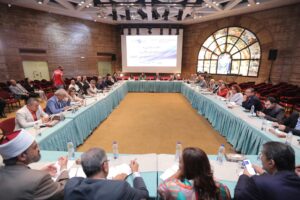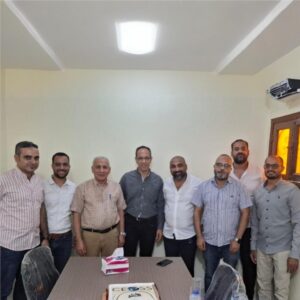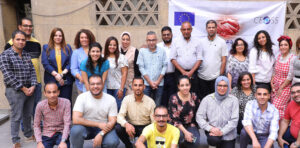Dr. Riham Bahi
Associate Professor, Faculty of Economics and political science Cairo university
Introduction
In November 2022, Egypt hosts the 27th Conference of the Parties of the United Nations Framework Convention on Climate Change (COP 27), with a view to building on previous successes and paving the way for future ambition to effectively tackle the global challenge of climate change. The hosting of COP27 in the green city of Sharm El-Sheikh this year marks the 30th anniversary of the adoption of the UNFCCC. Egypt aims to establish legally binding commitments for developed countries to reduce greenhouse gas emissions. Egypt focuses on urgent and priority issues in the African continent, in particular, and in developing countries in general, such as adaptation and climate finance. Egypt’s hosting of COP 27 is an affirmation of the importance of integration and consistency of national policies, strategies, plans and programs to confront climate change and achieve sustainable development.
Egypt is one of the most vulnerable countries from the effects of climate change, despite being one of the least countries contributing to greenhouse gas emissions, at 0.6 per cent of the world’s total emissions. In May 2022, Egypt has launched its National Climate Change Strategy 2050, in order to effectively address the repercussions of climate change in a way that contributes to improving the quality of life for Egyptians, achieving sustainable development, sustainable economic growth and preserving natural resources and ecosystems. The strategy integrates the adaptive plans in programs for sustainable development and addresses the engagement of civil society and community participation. It is against this background, that the Forum for Intercultural Dialogue (FID) came to be involved with issues of climate change, climate justice and climate peace.
Science continues to show that as the impacts of climate change accelerate, extreme weather events are taking a major toll in developing countries, particularly in Africa, home to some of the world’s largest youth populations. According to the UN, “the impact of climate change will not be borne equally or fairly, between rich and poor, women and men, and older and younger generations”. Consequently, there has been a growing focus on climate justice, which looks at the climate crisis through a human rights lens. Climate justice means linking human rights with development and climate action. Young people have historically led the charge against environmental and social injustice. The Forum for Inter-Cultural Dialogue (FID) is committed to breaking down climate science into a national conversation and connecting it to domestic social and cultural values to build relevance, awareness and societal capacity among young leaders in 11 Egyptian governorates.
The Forum of Inter-Cultural Dialogue:
Established in 1992 as one of the units of the Coptic Evangelical Organization for Social Services, the Forum of inter-Cultural Dialogue is committed to contributing to building a pluralistic democratic society based on the principles of citizenship, human rights, and multiculturalism. As a platform for cultural dialogue, FID cooperates with governmental institutions, civil society, faith-based entities and intellectuals at the local, regional and international levels. FID aims at building and strengthening the cultural, social and institutional essentials of citizenship in Egypt in order to achieve coexistence, peace, justice and social cohesion.
Environmental Citizenship:
FID activities aims at raising awareness and capacity development among young leaders from civil society, academic institutions, media, and faith-based entities in order to promote values such as dialogue, citizenship, human rights, cultural diversity and tolerance. These values have the capacity to promote coexistence and social cohesion in local communities. Accordingly, “environmental citizenship” has been integrated in FID activities related to promoting the concepts of citizenship and human rights. This integration has been based on the conviction that citizens’ awareness and public participation are important elements of a just climate policy. Environmental citizenship sets out citizens’ opportunities to act and participate in both mitigating climate change and adapting to it. Environmental citizenship is realized in everyday life individually and collectively through climate-friendly choices, civic activism or other communal activities. Environmental citizenship promotes new ways of thinking and acting about the climate change. This includes recognizing the value of livable environment for humans and nature, promoting conservation and restoration of resources and supporting nature protection and biodiversity. For that reason, the activities of FID have integrated the concept of carbon neutrality, which is a state of net-zero carbon dioxide emissions. This can be achieved by balancing emissions of carbon dioxide with its removal or by eliminating emissions from society. Carbon neutrality can achieved by calculating the Carbon Footprint and reducing it to zero through a combination of efficiency measures in-house and supporting external emission reduction projects. Carbon Footprint is a measure of the total amount of greenhouse gases (including carbon dioxide and methane) that are generated by human actions. Participants in the activities of FID were introduced to these concepts and were able to work in groups on ideas to reduce their carbon footprints through initiatives in their local communities.
Social Peace through Climate Citizenship:
In order to contribute to social peace and address the issue of climate change, FID introduced the crucial link between environmental citizenship and peace-building in its activities targeting civil society organizations and their capacity development in promoting the values of dialogue and peace through community initiatives. Environmental peacemaking brings societal parties together to work on environmental issues in ways that build confidence and reduce tensions. Building peace in fragile societies requires consideration of natural resource management. Some conflicts can be related directly to — or been fueled by — valuable natural resources such as water. Environmental issues can provide a less sensitive platform for dialogue and a reason for cooperation that can help to resolve differences among communities. Environmental peacebuilding provides opportunities for encouraging and implementing more bottom-up, community-based approaches that are inclusive and sustainable.
Forum of Inter-Cultural Dialogue: Climate Awareness and Community Activism
Recent FID activities shed the light on major impacts of climate change both locally and internationally. The activities also addressed the role the UN system in tackling climate change and introduced the Paris Climate Agreement 2015 and major international conferences on climate change. The Egyptian national efforts and strategy in addressing climate change were also discussed as well as the National Climate Change Strategy 2050. This strategy integrates the adaptive plans in programs for sustainable development and addresses the role of civil society and community participation.
Empowering societal organizations has been one of the major aspects of the FID methodology. Therefore, FID has been active in promoting environmental citizenship in its activities targeting civic engagement and capacity development of societal organizations. As a result, these organizations will be able to execute local initiatives, inspired by societal needs within the framework of FID values of dialogue, peace, and bottom-up development.
Through its activities, FID assisted and supervised one of the participating civil society organizations “Peacemakers” in developing a local initiative titled “Dialogue with the Environment”. This initiative has been developed, planned and executed by local youth. “Dialogue with the Environment” initiative aims at tackling local environmental challenges in order to conserve local resources, promoting societal peace through promoting dialogue and awareness and averting any societal conflicts that may be fueled by shortage of resources. The initiative targets raising environmental awareness among local youth through training, site visits, sports, and awareness campaigns.
Community initiatives is one the major change processes employed by FID to promote coexistence and social cohesion in local communities. Community initiatives guarantee the translation of FID values and norms into action. Community initiatives indicate the extent to which there is acceptance of the norms and values among community members (community buy-in).
Voices of the Participants in the Forum of Inter-Cultural Dialogue (FID) Activities:
Mohamed Shawky: The idea of environmental citizenship was new to me. We learnt new concepts such as carbon footprint. We discussed the relationship between conflicts related to scarce resources due to climate change. We learnt the link between climate change and peace and dialogue. We are trying through our organization “peacemakers” to promote those ideas in our local community through various sports and artistic activities in cooperation with FID.
May Shawky: I leant new concepts such as carbon footprint and global warming as well as Kyoto Protocol and Paris Agreement. I hope those agreements can be materialized.
Sarah Abdel Zaher: We attended a training in June 2022 on environmental citizenship and I learnt new concepts and topics such as Sustainable Development Goals, unstainable development, carbon neutrality, carbon footprint. We discussed the climate issues facing our local community and we worked in groups in order to come up with ideas to tackle them. The experience was very enlightening thanks to FID for giving us this opportunity.








